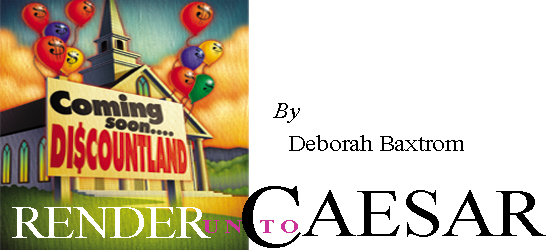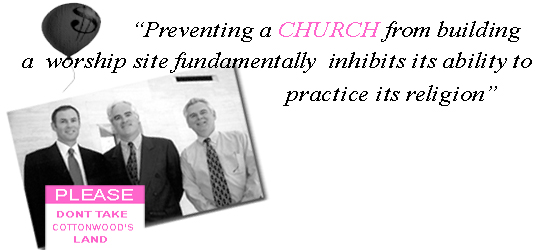Render Unto Caesar
Deborah Baxtrom January/February 2003
Illustration by Jack Slattery

Religion squared off with consumerism in Cypress, California, last May when the Cypress City Council voted unanimously to seize, through use of the city's power of eminent domain, 18 acres of land owned by the Cottonwood Christian Center in order to build a Costco discount store.
"The city is trying to feed its voracious appetite for property taxes," said Patrick Korten, a vice president of the Becket Fund for Religious Liberty, an organization helping to represent Cottonwood in the case. "If they get away with it, it would signal to other cities that they can prevent a church from expanding if they want to . . . it would essentially void the Religious Land Use and Institutionalized Persons Act." The federal RLUIPA was passed in 2000 to protect churches from discriminatory zoning and land-use policies.
This "mean" case began in 1997, shortly after Cottonwood outgrew its current facilities—the church started out with 50 members in 1983 and grew to 650 by 1989, when it relocated to Los Alamitos, California. Since that time its membership has soared to 4,000, and the church is bursting at the seams. Cottonwood supports a weekly international television program and many local community services. Its current auditorium seats only 700 people, so it must hold two services on Saturday and four on Sunday to oblige its numerous members and guests. Under the circumstances it's not surprising that Cottonwood was seeking to build a new home.
The church purchased the land in 1999, planning to build a new campus to accommodate its members and hundreds of guests, as well as facilities for classes, activities, and community services. Cottonwood paid million for the acreage, funded solely through tithes and donations, after negotiating with four different owners for six separate tracts of land.
Prior to Cottonwood's interest, the land had sat vacant for almost a decade, yet the Cypress City Council made no attempt to develop it until the church purchased the property, located near a racetrack in the affluent southern California community of 47,000. From the outset Cottonwood kept the city informed of its intent to build a new facility; but, according to the church, the city did not inform Cottonwood that it had a project of its own in the works—a revenue-generating shopping plaza. In October 2000 the church filed an application for a Conditional Use Permit, anticipating little difficulty, but the city rejected its application, stating that Cottonwood had not submitted a Preliminary Design Review (which was listed as "optional" on the application).
The day after rejecting Cottonwood's application, the city informed the church that it was adopting a moratorium on all new permit applications in the redevelopment area of which Cottonwood's land was a part. The moratorium lasted about a year. During this time the city conferred with commercial developers, including Costco.
"The city looked at the planning process and the conceptual plans for what the church was proposing," said Cottonwood spokesperson Mary Urashima. "[The council] never told them they [were] talking to a developer of the shopping center until they got the letters of participation."
According to the church, the Cypress City Council eventually admitted that it had improperly rejected Cottonwood's application for a Conditional Use Permit. However, at about the same time it accepted a development proposal from Costco to place a retail outlet on the property—property that it did not yet own.
"[The council's] actions certainly bring into question whether they have been negotiating in good faith or whether it's all been a ploy for public perception," said Jon Curtis, a Cottonwood attorney. "Throwing out a church for a retail use solely because of sales tax and property taxes that would be accumulated is basically . . . discriminating against the religious organization. It's the purest form of discrimination." David Belmer, Cypress's community development director, disagreed. "[The council has] a fiduciary responsibility to manage the city such that it has sufficient revenues to provide the services our residents have come to expect," Belmer insisted.
"Does this action threaten every church in Cypress? Absolutely not," Belmer continued. "Does this action mean there is going to be some rampant move to condemn church property throughout our city, the state, and the country? I'm hoping that most reasonable people will find that idea far-fetched. This is a strategic piece of property in a key project area in our city, and our interest predates Cottonwood's interest. That's our story and we're sticking to it."

Pastor Bayless Conley, however, felt that his church was singled out for discriminatory treatment. "Considering we are only 18 acres in a 300-acre redevelopment zone—and we are the only one being asked to move—the process felt imbalanced," Conley told CNSNews.com.
Cottonwood offered to give up its corner of prime land if it could be allowed to build on an adjacent property, but the Cypress City Council declared the church's plan "unresponsive," and deemed Costco's plan "responsive," thereby accepting the shopping center project and effectively shutting out the church.
In January 2002 Cottonwood Christian Center filed a lawsuit against the city of Cypress, arguing that the city was discriminating against the church and was in violation of RLUIPA, the First Amendment, California redevelopment laws, and the equal protection clause of the California Environmental Quality Act.
The city council went ahead with its development plans in spite of the lawsuit and in June voted 4-0 (with one member abstaining) to proceed with eminent domain action against Cottonwood. This marked the first time a city had voted to use eminent domain to take church property since the passage of RLUIPA. As part of the eminent domain action, Cypress informed Cottonwood that it would pay the church .6 million for its property.
It was at this point that the already controversial issue blew up in the faces of Cypress city officials, who probably never expected their actions to cause a national uproar. Newspaper editorials appeared, first locally, then nationally, denouncing the council's actions as arrogant and uninformed.
The Los Angeles Times reported that "An Oklahoma firm . . . sent 50,000 glossy mailers lambasting Cypress officials, and legal organizations in Washington, D.C., and Colorado are drafting motions on behalf of the church."
The Wall Street Journal offered its opinion, stating: "The powers of eminent domain are tricky enough when exercised for highways, schools or other public uses. But when invoked on behalf of a private business it represents the worst form of political collusion. Our advice to Cottonwood is not to turn the other cheek."
A number of California assembly members sent letters to the Cypress City Council, strongly urging them to change their position. Republican assembly member Ken Maddox wrote (on behalf of himself and five other
Republican assembly members): "By choosing a big box retail center over church property, the city is sending a message that material wealth is more important than the spiritual and moral well-being of a community. This hostility toward religious expression is disturbing, considering the positive contribution churches make to a city."
Some Cottonwood church members were instrumental in damaging their own cause. On one such occasion the Orange County Register reported that 30 supporters of the city council were confronted by 500 church members outside a city hall meeting. The newspaper recounted that church supporters were "jeering and waving signs reading 'Jesus or Hell' and 'Thou Shall Not Covet God's Property.'" Such actions on the part of a number of church members engendered among the residents of Cypress some sympathy for the city council.
"There is no comparison between the benefits of a Costco and the cost of a church," said one longtime Cypress resident. "My neighbors and I have been watching this go on for two years, and we're tired of this big church trying to bully the city by busing its members in from all around the county to harass our city council. Given the behavior of the church, we're not seeing its spiritual value. I'm not sure we want them in town."
"I think the average person doesn't understand the law of eminent domain," said another local. "So when a powerful church . . . says Cypress is stealing a church's land, it's very confusing for many residents. If this is the kind of neighbor it's going to be . . . don't want them in Cypress at all."
However, a third resident, who has lived in Cypress for 15 years, had a different view. "We're in all the newspapers," she said. "I hear everyone talking about what our city has done and I'm thinking: 'There are five ignorant people on my council, and how the heck do I get them off?'"
"Sometimes you have to make some difficult decisions, and you have to get down to the bottom line," said council member Anna Peircy. "We've never denied that it is a great church. The problem is a land-use issue."
A land-use issue it may be, but in August Judge David O. Carter issued a preliminary injunction against the city of Cypress, making it clear in his statements that he strongly disagreed with Peircy's assessment.
"There is strong evidence that [the city's] actions are not neutral, but instead specifically aimed at discriminating against Cottonwood's religious uses," Judge Carter wrote. "For nearly a decade, the Cottonwood property sat vacant. Once Cottonwood purchased the land, however, the city became a bundle of activity. . . . Why had the city, so complacent before Cottonwood purchased the property, suddenly burst into action? . . . [The activity suggests that the city was simply trying to keep Cottonwood out of the city, or at least from the use of its own land.]
"Preventing a church from building a worship site fundamentally inhibits its ability to practice its religion," Judge Carter continued. "Churches are central to the religious exercise of most religions. If Cottonwood could not build a church, it could not exist."
Carter also pointed out that even if the city did have compelling reasons to burden Cottonwood's religious exercise, "they must do so in the least restrictive means. . . . The city has done the equivalent of using a sledgehammer to kill an ant."
How about the city's argument that giving the land to Costco would provide better-funded public services? Judge Carter wrote, "If revenue generation were a compelling state interest, municipalities could exclude all religious institutions from their cities."
Even in the face of the preliminary injunction the Cypress City Council and its attorneys have not admitted defeat. The council issued a press release stating that in granting the preliminary injunction that stopped Cypress from taking Cottonwood's land, the judge has only maintained the status quo until the final case can be decided in March 2003.
However, the preliminary injunction gives Cottonwood and its supporters a solid reason for optimism.
Kevin J. Hasson, president of the Becket Fund, stated, "The reason there are so few cases like this is that most cities know better than to seize a house of worship's property. Cypress made a big mistake, and we hope that cities across the country learn from their mistake."
Pastor Conley, for his part, is simply ready to move on to what he views as more important matters. "This is wonderful news for Cottonwood," said Conley. "We are one step closer to being a blessing to the community, which is what we've wanted all along." 